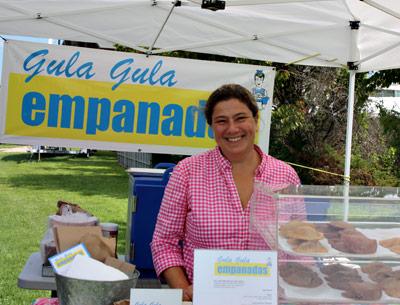Surprising Success With Homemade Empanadas

In her native Uruguay, Luisa Masliah, who is called Luchi, earned a degree in clinical psychology. But her first business, started with friends right after college, was a gourmet takeout shop called Gula Gula.
In its literal translation to English, the Spanish term “means more like gluttony,” she explained during a recent interview in East Hampton, but also refers to eating with enjoyment, or “comer con gusto.”
“It does imply a little bit of an excess,” Ms. Masliah said. That excess spills over joyfully in her enthusiasm for her chosen field — the food business — and her most recent foray, Gula Gula Empanadas.
With her teenage daughter, Lucia Robinson, and other helpers, Ms. Masliah each week produces thousands of empanadas — small, folded pastries that can be eaten out of hand, stuffed with a variety of tasty fillings such as seasonal leafy greens with manchego cheese, black beans and corn; jalapeno, cilantro, red pepper, and zucchini, or Indian-spiced potatoes and spinach. A chicken version also has a Southwestern spin, with roasted poblanos and tomatillos and chipotle puree, while a bison filling has the “traditional flavors from the Rio de la Plata,” Ms. Masliah said, with green olives, onions, raisins, and garlic in a crispy olive oil crust. The fish empanadas are filled with a Galician-style mix of albacore tuna, flounder, roasted red pepper, kalamata olives, tomato, parsley, and onion.
This summer, the empanadas were sold at local farmers markets. They can be purchased at the Sag Harbor Farmers Market on Saturdays this fall ready to eat or packaged and frozen in regular and mini sizes, which have become popular with local caterers who use them for hors d’oeuvres. Customers can also order them by phone, and Ms. Masliah or a helper will deliver.
As a young child with a stay-at-home mom who was, Ms. Masliah said, “an excellent cook,” she worked alongside her mother to make a midday meal for siblings returning home from school. In Uruguay, she said, there were “all kinds of food,” reflecting the cultural heritage of residents: Russian, Lithuanian, Turkish, Italian.
But when she arrived in New York City 25 years ago to pursue a master’s degree, she found still more culinary horizons, encountering all kinds of new world cuisines. She signed up for classes in regional cooking and in the business side of the food world, and ended up developing a business with a housemate who was a former Wall Street trader providing healthy lunches to traders on the stock market floor.
It was the early ’90s, and the interest in eating a low-cholesterol, low-fat, healthy diet was growing. The two would make the lunches at their Brooklyn apartment, and then, Ms. Masliah said, “get on the L train with bags of food,” for delivery. Her experience grew after she became the chef for a classmate who started a heart-healthy catering business.
Soon, Ms. Masliah began working during the summers at the former Amagansett Fish Company, owned by a friend. With her husband, Wayne Robinson, she took over the business and ran it for several years.
The couple, she said, reinvented themselves, after selling the business. Putting her psychology and social work degrees to work, she became a bilingual caseworker for East Hampton Town’s Housing and Human Services Departments, and then a mortgage broker. When the mortgage business suffered, she went into insurance.
But, Ms. Masliah said, “it was the wrong environment. It was all wrong. I kept thinking, ‘food, food, food.’ ” She began making and selling empanadas in her free time, but eventually had to make a choice. Going with her heart, she said she told her husband, “I’m going to jump. So I just want to warn you.”
Gula Gula Empanadas became her full-time business and passion last spring. “I’m a lot happier,” she said. “It’s been so much fun. And it’s really tough work.”
“To make it in the food business, it’s really difficult.” But, she said, the tradeoff is the satisfaction — “to make a living doing something I love doing.”
“I like to deliver food that is great food, tasty, quality, but at prices that are reasonable,” she said.
In the future, Ms. Masliah hopes to have a retail shop somewhere on the East End, and envisions, perhaps, providing empanadas for school lunches as a healthy, kid-friendly, and fun alternative. Paired with a quick salad or a side dish, she said, empanadas can anchor a complete meal.
In the meantime, with the outdoor market season winding down, she has plans to market packaged Gula Gula Empanadas to local shops.
